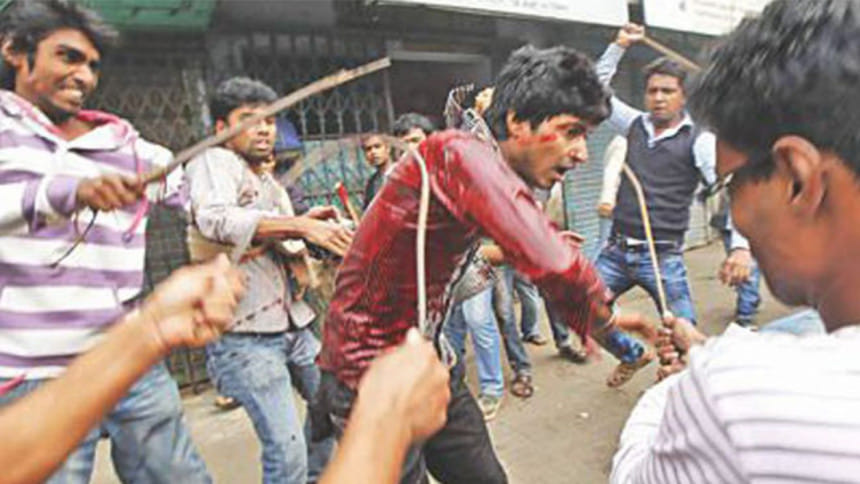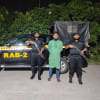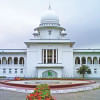Biswajit, murdered twice

On the very day that the world was observing the International Human Rights Day in 2012, a poor man was denied the basic right guaranteed to all human beings under God—right to life. Biswajit was a victim of depraved politics, killed brutally by some members of the student wing of the ruling party.
We said in these very columns five years ago lamenting his death that he was a victim of politics totally bereft of morality, hankering after power. And one cannot help repeating what was vented in this very space that, "bad politics makes animals of human beings there is no doubt, and one cannot avoid a feeling of strong revulsion that such brutes should be categorised as humans. What we saw being done to Biswajit by his fellow beings is not to be found even in the animal world. It was not Biswajit that perished in the face of a cruel and merciless attack, the perpetrators were cruelty personified passing off as human beings. It was humanity that became victim of man's animal instincts, an instinct nurtured by hatred towards political opponents and fed on the mutual animosity of the leaders of the two parties."
What was shocking was the loud reticence of the so-called conscience of the society to condemn the killings, perhaps because the conscience they carried in them were not moved enough by the wrongs of those that belonged to the party they ingratiated themselves by being associated with. Biswajit's greatest misfortune was that he was killed by the wrong party goons.
But if that was the first time Biswajit fell victim to man's cruelty, then the second time he was victim to man's devilry. The very process of the investigation reeked of complicity to dilute the case, while the politicians were busy trying to prove that the alleged killers did not belong to their party. The remark of the home minister was blatantly partisan. All kinds of dilatory comments were thrown up as red herrings to the extent that reservations about the veracity of the videos and photographs were expressed by people holding responsible office. And it was suggested that only if the pictures were found to be true would the police take action. And the statements of the minister and the police regarding the arrest of the alleged killers were contradictory.
I recount all these facts to reinforce the point that there were attempts to weaken the case as the observations of the Honourable High Court indicate. And that was when Biswajit was killed the second time.
And evidently, political link worked in the investigation process. Either the medical examiner was blind or he had done autopsy of a different person. His report belied what the footages and statements of the accused exposed.
And eleven amongst the accused are absconding. Apparently some of them have acquired the ability to become invisible very selectively. One of them, reportedly, is frequenting between two of our neighbouring countries and commenting on Facebook! One wonders how so many accused in a sensational murder case manage to remain fugitives.
While delivering its verdict on the death reference and appeals of the accused, the Court has asked the authorities to find out the possible lapses in the autopsy and investigation of the killing. The Court would not have given such directive were there not sufficient grounds for it to suspect dereliction of duty.
Though no judgment is beyond criticism, one would be doing great injustice to the judiciary if motives were ascribed to the judgment, as a former chief justice has done in commenting on the Supreme Court verdict on scrapping of the 16th Amendment. It is not for us to judge the verdict or the differences between the two courts in the degree of punishments awarded. A court's verdict stems from the available evidence produced before it, nothing more and nothing less. And of course there are exculpatory circumstances that the court can take cognisance of in awarding punishments. Everything is predicated on how the court in its wisdom sees the evidence.
Our issue is with those that prepared the case for trial. Credit must go to the government for trying the case in speedy trial court which delivered the verdict after less than a year's trial. But a legal process is more than just holding trial. It must be seen that the case has cent percent chances of conviction. In this regard a report in a Bangla daily reveals a very disturbing truth. It says 88 percent of the accused in cases of murder, rape, women repression etc. escape punishment. Of the many reasons for this, experts opine, are weakness in the process of investigation and money and political power. Biswajit's murder investigation is a blatant example.
We must remind ourselves that the legal process cannot be strengthened if the people associated with it lack integrity and professionalism. Merely holding trial doesn't necessarily guarantee delivery of justice.
Brig Gen Shahedul Anam Khan ndc, psc, (Retd) is Associate Editor, The Daily Star.









Comments